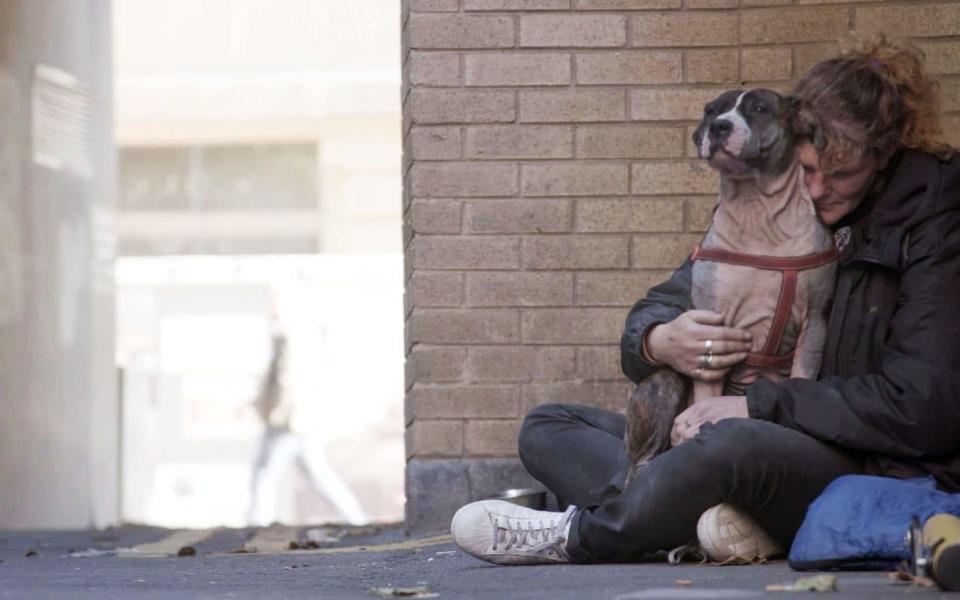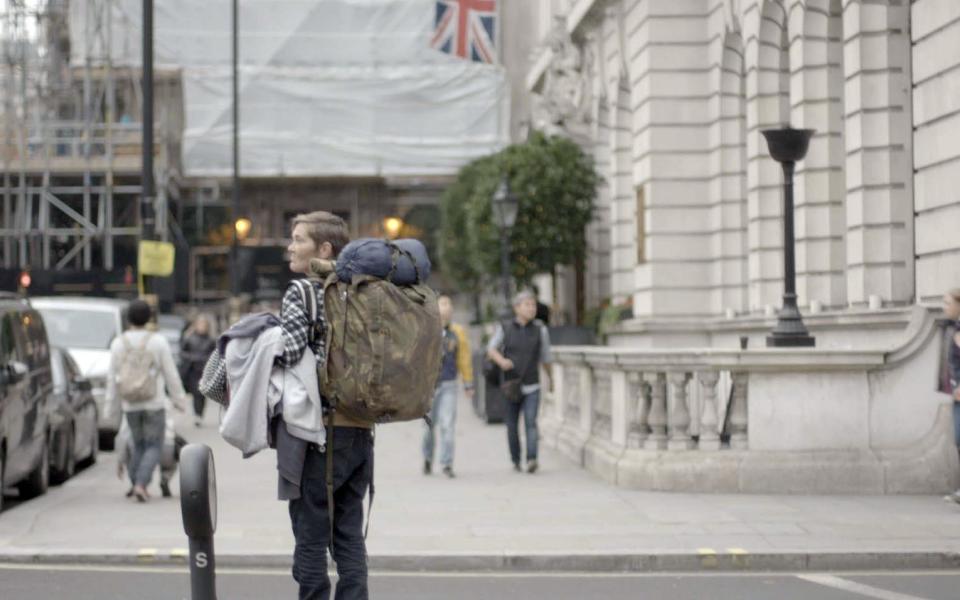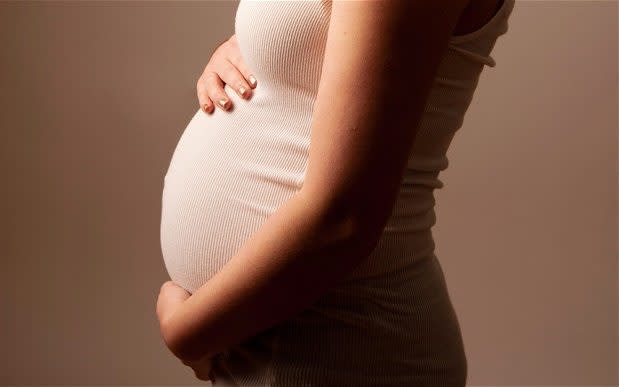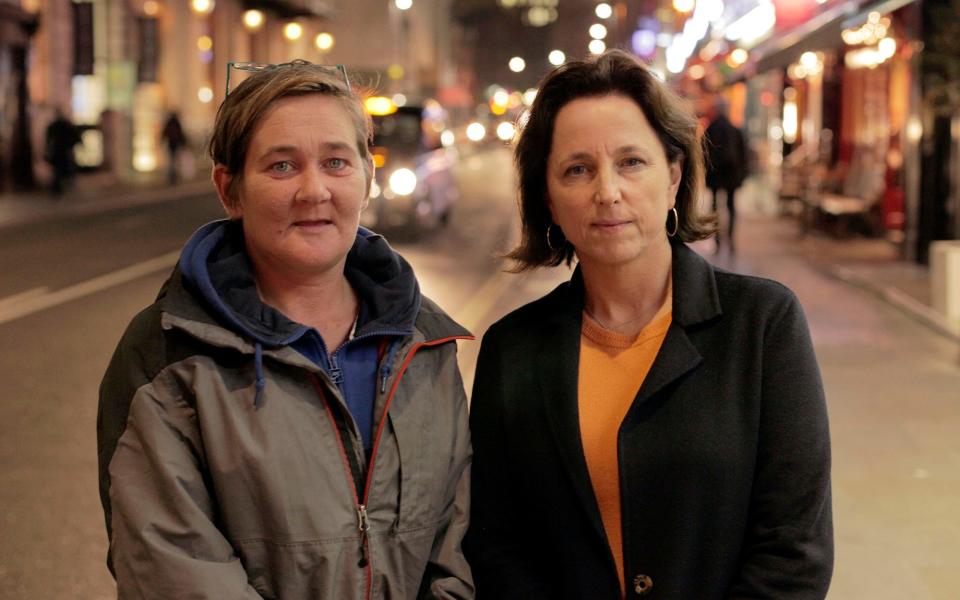The scandal of pregnant women sleeping rough on Britain's streets
The first thing that strikes you about Tina when you meet her is how small she seems, hardly fit to carry the huge rucksack she has on her back. Tina has been living on the streets for six years, every night looking for somewhere to sleep that will keep her safe until the morning. That rucksack contains everything that she owns in the world.
Originally from Ireland, her story fits a familiar pattern for women who end up sleeping rough. After a tough childhood she left home at an early age, and went on to be the victim of domestic violence. There have been problems with drink and drugs. And then there are her lost children. Tina says her five kids were taken away from her by social services, four days before Christmas in 2008 and are now in long-term care.
"Every day of my life it hurts," she says. "Just thinking about them makes me cry."
Tina is one of an increasing number of women at the extreme end of Britain's homelessness crisis. There are no official figures on female homelessness, which is defined as not having a permanent residence. Some estimates have been widely criticised as inaccurate due to data collection methods, which have only counted people visible in a single snapshot.
But we do know that there are 68,000 women living in temporary accommodation, emergency shelters or sleeping on the streets.
Sarah was sleeping in a Manchester car park and six months pregnant. It was painful to see the 36-year-old lie down on her makeshift bedding, holding her tummy
Crisis says year on year more women are ending up sleeping rough and new research the charity released to the team at Dispatches, for our film on the subject, shows just how dangerous that can be. One in four women said they had been subject to sexual assault in the last twelve months. Almost 60 per cent who had slept rough said they had been subject to, or feared they were going to be subject to, physical violence and threats.
As Kelly gets ready for bed in a Manchester doorway, you can hear the fear in her voice. She makes every effort to disguise the fact she's a woman, pulling her hood tightly around her face to cover her shoulder- length hair.
Like three- quarters of all women sleeping rough she has mental health and drug issues. Her children were taken into care three years ago and she was evicted from her home. Once her family life disappeared, life spiralled downwards.
"I was a mum of four children and that's all I did, all day, every day,” she says. “I loved being a mum, it was all I wanted to be. It's all I ever did. Since losing the children, since becoming homeless, the depression has worsened. It’s consumed me."
Government guidelines on homelessness are clear. If you are deemed vulnerable because you are suffering from a mental illness, or are fleeing domestic violence or pregnant, your situation should be assessed and you should be offered immediate emergency accommodation.
But our investigation confirmed the long-stated fears of housing charities such as Shelter, Crisis and Solace Women’s Aid that local authorities aren't always fulfilling their obligations to some of the most vulnerable women in Britain. Instead, they are acting as "gatekeepers" - actively turning them away.
Dispatches sent three actresses - who'd all had previously experience of being homeless - to find out just how councils were responding to women who had cases which, if examined, would suggest they were vulnerable and had a right to emergency accommodation.
One presented mental health problems, another said she was fleeing domestic violence and a third claimed to have learning difficulties.
The housing officers have become desensitised almost completely to the cases that are sitting there in front of them
Mary Mason, Solace Women's Aid
Of the 15 occasions the actresses presented themselves to local authorities, they were offered help just four times. The rest they were effectively sent out to spend the night sleeping rough.
Mary Mason, chief executive of the charity Solace Women's Aid told us, "The housing officers often are creating a kind of barrier so they're trying to reduce the number of people who are coming through the system. (They) have become desensitised almost completely to the cases that are sitting there in front of them."
Perhaps most shocking of all was the claim from homeless charities, which surfaced during our research, that pregnant homeless women - for whom, again there are no official numbers - were being turned away by local authorities.
Thirty-six year old Sarah was sleeping in a Manchester car park when Dispatches filmed her. She had been homeless for 14 weeks and was six months pregnant. It was painful to see the 36-year-old lie down on her makeshift bedding of cardboard boxes, on the concrete floor, holding her tummy.
She is looking forward to the baby - a boy - being born, but not with much confidence. She knows how dangerous it is for her to be on the streets and even if she reaches full term, the chances of her baby being taken away by social services due to her homelessness are high.
She claims that she went to the council early in her pregnancy but was told she wouldn't be a priority until much closer to giving birth - a claim rejected by Manchester City Council, who say they have no record she contacted them. Their spokesperson said, “We would always treat a pregnant woman presenting as homeless as priority regardless of the length of time she has been pregnant. We would never turn a pregnant woman away.”
In the end, Sarah lost her baby a month after filming, miscarrying in hospital. Afterwards she went back to begging on the streets.
By the time women end up sleeping rough they often have significant problems - mental health issues and addictions. There is no question that they can be difficult to help. That is why early intervention is key - why these vulnerable women need the help that the Government's own guidelines say they are entitled to.
The Government is currently attempting to shift the focus to prevention. Its homelessness reduction bill is currently awaiting its second reading and should, when passed, give councils a further £48 million funding to expand services. The Government claims that anyone at risk of losing their home will get the help they need more quickly, while those already homeless will be entitled to increased support to help secure them accommodation.
The question is - will it be enough? One estimate from the Association of Housing Advice Services puts the true cost of the new changes to London councils at £161 million alone.
As Tina settles down for the night in another doorway in London, it's hard to see whether the help will come soon enough for her. At 40 years old she doesn't even talk convincingly any more about finding somewhere permanent to live. She seems resigned to staying on the streets.
"I always had a picture of a fairy tale ending in my life," she told me. "It never happens."
Undercover: Britain’s Homeless Scandal: Channel 4 Dispatches is on Channel 4, tonight at 8pm





